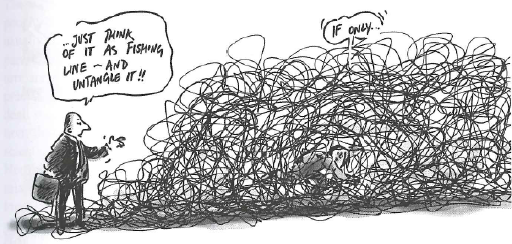1.1 An important ambiguity
The suggestion that messy situations are in some significant respects unbounded is helpful, but it is also ambiguous on an important point. What has not been made explicit is whether this quality of being unbounded is a characteristic of one person’s experience of the situation, or is actually in the nature of the situation itself. In other words, is a messy situation one that someone can’t see how to disentangle from everything else; that appears to them to be unbounded – and hence for that person it is unbounded? Or does saying the situation is unbounded mean that the circumstances are such that the situation really does have very extensive ramifications?
The first of these possibilities is attractive. It amounts to saying that a messy situation is whatever the person concerned experiences as a messy situation, and it implies that you will understand the situation once you become more familiar with it. We have all experienced situations that seem immensely complicated at first, but that proved easy, ‘once one knew how’.
In general, a situation that appears very messy to one person might only be a difficulty to someone with lots of experience of tackling comparable situations. In such cases it’s tempting to say that the same situation is a mess for one person and a difficulty for another. But this position has a serious flaw: it may sound reasonable to define a mess as any situation I experience as a mess, but there is something decidedly unsatisfactory about the converse: ‘if I think it’s only a difficulty, then it is only a difficulty’. The trouble is that this definition implies that no one can ever be mistaken about whether they are dealing with a difficulty or a mess, and yet I talked earlier about being trapped in one’s way of thinking. Such mistakes are actually rather common. Indeed, it is often the failure of my efforts to resolve what I had assumed to be a difficulty that makes me realise I’m really tackling something much messier. (Happily, the opposite mistake sometimes occurs too: what I had thought was a really unmanageable situation, turns out as I get closer to it, to be something that can after all be satisfactorily tackled on a local basis in a straightforward way.)
Activity 2 Reviewing your notes on difficulties and messes
Reviewing Activity 1, compare your notes on the differences between difficulties and messes with those given in the video (repeated below). The following questions should help. You should definitely not be marking your list (‘I got that one’ or ‘I missed that one’). That is not the point of the activity. If anything, you should be marking my list in relation to your experience.
- Have you been using the term ‘messes’ in a completely different way to cover only unpleasant situations, for example? What I call messes, you may prefer to call challenges.
- Do you disagree with any of my points? Does it trouble you that I talk of problems that have no real solutions?
- Can you think of occasions when you have considered a mess as a difficulty, and vice versa? How do you account for the differences? In what other ways have you been aware of a discrepancy between how a mess appeared and how it turned out to be?
- Do the characteristics of messes shown in the video add to, or help you clarify, your understanding of what constitute for you ‘big complicated situations’? Or do you feel that somehow my discussion has so far missed essential aspects of the circumstances you find demanding and troublesome? Are you aware of important aspects not dealt with so far?

Transcript
Comment
That the characteristics of messes and difficulties are influenced by the perspectives of the observer may seem uncontroversial, but how much is this simply taking a rational approach to complex situations? Did you also have an emotional reaction when writing down your thoughts? Does this matter?

